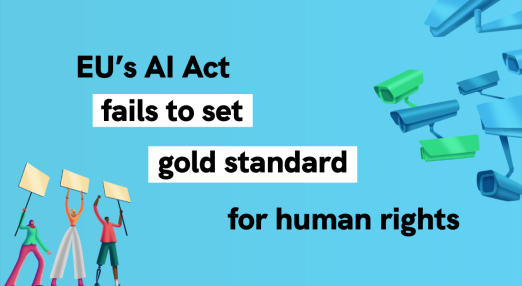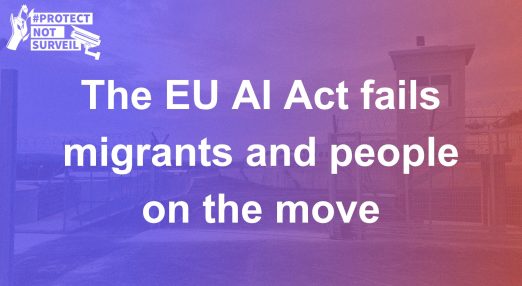AI Act
Filter by...
-

Packed with loopholes: Why the AI Act fails to protect civic space and the rule of law
The European Parliament approved the AI Act on 13 March 2024, thus marking the end of a three-year-long legislative process. Yet to come are guidelines and delegated acts to clarify the often vague requirements. In this article, ECNL takes stock of the extent to which fundamental rights, civic space and the rule of law will be safeguarded and provide an analysis of key AI Act provisions.
Read more
-

The two sides of web scraping: When data collection becomes a double-edged sword
Emerging AI technology often relies on methods of data collection – such as web-scraping – which can become a double edged sword when not used with safeguards and transparency or in ways that are unlawful. These methods have been used to achieve several key victories for digital rights, but can also be exploitative.
Read more
-

EU’s AI Act fails to set gold standard for human rights
A round-up of how the EU Artificial Intelligence (AI) Act fares against the collective demands of a broad civil society coalition that advocated for prioritising the protection of fundamental human rights in the law.
Read more
-

#ProtectNotSurveil: The EU AI Act fails migrants and people on the move
The #ProtectNotSurveil coalition is calling attention to how the EU AI Act - adopted by the European Parliament on March 13 - is failing to prevent harm and provide protection for migrants and people on the move.
Read more
-

#PrivacyCamp24: Event summary
On January 24, 2024, we brought together policymakers, activists, human rights defenders, and academics from all over Europe for Privacy Camp 2024. We came together to explore the theme ‘Revealing, Rethinking, and Changing Systems’.
Read more
-

Council to vote on EU AI Act: What’s at stake?
The EU Council is set to vote on the AI Act on 2 February after three years of negotiation on this legislation. Our civil society AI coalition summarises the latest updates, what is at stake, and civil society's views on the AI Act.
Read more
-

Civil society statement: Council risks failing human rights in the AI Act
In the run up to EU AI Act trilogue negotiation, 16 civil society organisations are urging representatives of the Council of the European Union to effectively regulate the use of AI systems by law enforcement, migration control and national security authorities in the legislation.
Read more
-

Potential loopholes in the AI Act could allow use of intrusive tech on ‘national security’ grounds
Both the European Union (EU) and the Council of Europe (COE) negotiations are considering excluding AI systems designed, developed and used for military purposes, matters of national defence and national security from the scope of their final regulatory frameworks. If this indeed happens, we will have a huge regulatory gap regarding such systems.
Read more
-

EU lawmakers must regulate the harmful use of tech by law enforcement in the AI Act
115 civil society organisations are calling on EU lawmakers to to regulate the use of AI technology for harmful and discriminatory surveillance by law enforcement, migration authorities and national security forces in the AI Act.
Read more
-

EU legislators must close dangerous loophole and protect human rights in the AI Act
Over 115 civil society organisations are calling on EU legislators to remove a major loophole in the high-risk classification process of the Artificial Intelligence (AI) Act and maintain a high level of protection for people’s rights in the legislation.
Read more
-

All eyes on EU: Will Europe’s AI legislation protect people’s rights?
As the EU’s AI Act moves into the final phase of negotiations, key battles arise for the protection of human rights.
Read more
-

Civil society calls on EU to protect people’s rights in the AI Act ‘trilogue’ negotiations
As EU institutions start decisive meetings on the Artificial Intelligence (AI) Act, a broad civil society coalition is urging them to prioritise people and fundamental rights in this landmark legislation.
Read more
